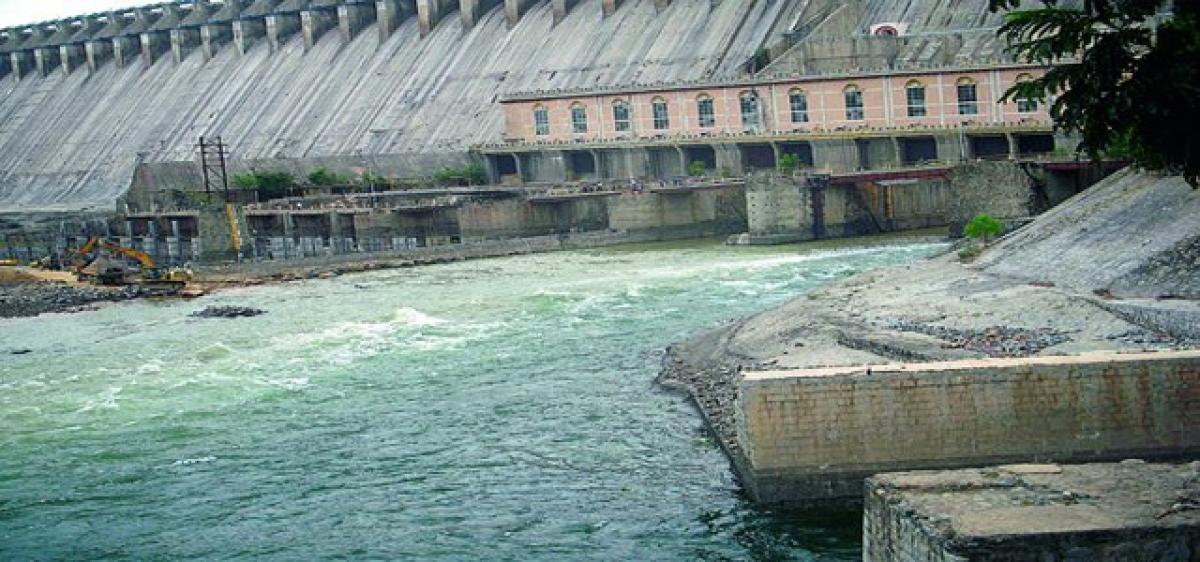Live
- National Energy Conservation Day: Fostering a sustainable future
- RG Kar issue: Day-long protests in Kolkata today on bail to Ghosh, Mondal
- Plans afoot to bring EPFO service at par with banking: LabourSecy
- vivo unveils X200 series of mobiles
- Sensex, Nifty stage a surprise recovery
- Govt commits to tackling maternal healthcare, deaths
- Capex to touch Rs 11.11-trn target this fiscal
- HCLTech launches TechBee
- Industrial growth recovery expected in H2
- No arrests made yet, says Police Commissioner
Just In

At the apex council meeting, both Telangana and Andhra Pradesh are likely to quarrel over the vexed differences stemming out of the bifurcation of the united State. But, there is an urgent need to unitedly fight the injustice meted out by the award of the Second Krishna Water Disputes Tribunal (KWDT-2) headed by Justice Brijesh Kumar Mishra.
At the apex council meeting, both Telangana and Andhra Pradesh are likely to quarrel over the vexed differences stemming out of the bifurcation of the united State. But, there is an urgent need to unitedly fight the injustice meted out by the award of the Second Krishna Water Disputes Tribunal (KWDT-2) headed by Justice Brijesh Kumar Mishra.
Both the successor States will be losing heavily if the award comes into operation. Telangana has demanded that the tribunal consider the sharing of river waters afresh as the State was not a reality when the award was pronounced. Even Andhra Pradesh is echoing a similar sentiment. But, the upper riparian states, Karnataka and Maharashtra, are opposed to the idea.
Their contention is that the State Reorganisation Act only mandates making project-wise allocation among the two successor States. Thus is the imperative for a united action plan to counter the stand of Karnataka and Maharashtra. Otherwise, the interests of both the successor States will be in serious jeopardy as the KWDT-2 made an arbitrary award.
As per the KWDT-1, the united Andhra Pradesh had freedom to use surplus waters. The united State asked the KWDT-2 to convert this freedom into a right. Instead, the Brijesh Kumar Mishra tribunal has removed that freedom and allocated even the surplus waters among the riparian States. This will upset many projects planned with a hope on surplus water.
These projects exist in both Telangana and Andhra Pradesh. The formula adopted by the KWDT-2 is erroneous for several reasons. The yearly river yields were arrived at on the basis of 65 per cent dependability whereas the KWDT-1 called the Bachawat Tribunal Award was based on 75 per cent dependability. Similarly, the Bachawat Tribunal calculations were on the basis of a longer period of 78 years, whereas the Brijesh Kumar tribunal used only 47 years as a frame of reference. In fact, the united State asked for 112 years.
Lower the dependability the greater will be the damage to lower riparian States. The upper riparian States, Karnataka and Maharashtra, are resorting to multiple ways of hurting the interests of lower riparian States. Instead of addressing the grievances of the united Andhra Pradesh, the Brijesh Kumar Mishra tribunal went ahead and legitimised these illegal acts of upper riparian States.
Besides, the KWDT-2 has allowed Karnataka to raise the height of Almatti dam. This would severely restrict the water flows into the Srisailam and the Nagarjuna Sagar projects in the downstream. Sharing of waters in distress years remains a challenge.
Precisely for these reasons, Karnataka and Maharashtra are resisting the allocation of Krishna waters afresh among the four riparian States. The reorganisation of Andhra Pradesh was effected even before the KWDT-2 came into operation. Therefore, the demand for a fresh allocation is justified. Telangana and Andhra Pradesh should jointly work out a strategy to this effect rather than get caught in the tangled web of murky differences.

© 2024 Hyderabad Media House Limited/The Hans India. All rights reserved. Powered by hocalwire.com







